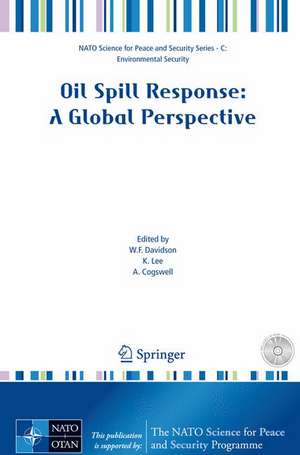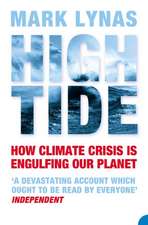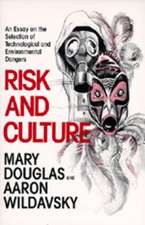Oil Spill Response: A Global Perspective: NATO Science for Peace and Security Series C: Environmental Security
Editat de Walter F. Davidson, Kenneth Lee, Andrew Cogswellen Limba Engleză Mixed media product – 8 iul 2008
This book provides a timely international perspective on applied research and development, technology transfer, and “lessons learned” from field trials and actual case studies associated with recent spill events. Topics include Preparedness/Contingency Planning, (Eco-terrorism); Oil Spill Fate and Transport (Environmental Persistence, Remote Sensing, modelling, Biodegradation), Biological Effects (Environmental Effects Monitoring and Environmental Risk Assessment); and Operational Response (Containment/Recovery Treating Agents, Shoreline Cleanup, In-situ Burning, Emerging Response Strategies). This book provides a synopsis as to the methods currently employed to deals with spills and an insight on future technologies under development.
| Toate formatele și edițiile | Preț | Express |
|---|---|---|
| Hardback (1) | 1227.52 lei 6-8 săpt. | |
| SPRINGER NETHERLANDS – 8 iul 2008 | 1227.52 lei 6-8 săpt. | |
| Mixed media product (1) | 1222.94 lei 6-8 săpt. | |
| SPRINGER NETHERLANDS – 8 iul 2008 | 1222.94 lei 6-8 săpt. |
Din seria NATO Science for Peace and Security Series C: Environmental Security
- 18%
 Preț: 1106.00 lei
Preț: 1106.00 lei - 15%
 Preț: 659.70 lei
Preț: 659.70 lei - 18%
 Preț: 999.60 lei
Preț: 999.60 lei - 18%
 Preț: 1221.07 lei
Preț: 1221.07 lei - 18%
 Preț: 1220.75 lei
Preț: 1220.75 lei - 18%
 Preț: 940.39 lei
Preț: 940.39 lei - 18%
 Preț: 1216.78 lei
Preț: 1216.78 lei - 18%
 Preț: 1232.71 lei
Preț: 1232.71 lei - 18%
 Preț: 1818.02 lei
Preț: 1818.02 lei - 18%
 Preț: 1833.95 lei
Preț: 1833.95 lei - 18%
 Preț: 1231.47 lei
Preț: 1231.47 lei - 18%
 Preț: 942.44 lei
Preț: 942.44 lei - 18%
 Preț: 1218.06 lei
Preț: 1218.06 lei - 18%
 Preț: 1383.00 lei
Preț: 1383.00 lei - 15%
 Preț: 664.29 lei
Preț: 664.29 lei - 18%
 Preț: 1220.88 lei
Preț: 1220.88 lei - 24%
 Preț: 1040.03 lei
Preț: 1040.03 lei - 18%
 Preț: 1222.80 lei
Preț: 1222.80 lei - 18%
 Preț: 1220.75 lei
Preț: 1220.75 lei - 18%
 Preț: 1224.85 lei
Preț: 1224.85 lei - 18%
 Preț: 1224.85 lei
Preț: 1224.85 lei - 18%
 Preț: 1224.68 lei
Preț: 1224.68 lei - 18%
 Preț: 963.15 lei
Preț: 963.15 lei - 18%
 Preț: 1229.10 lei
Preț: 1229.10 lei - 18%
 Preț: 1222.49 lei
Preț: 1222.49 lei - 18%
 Preț: 1223.74 lei
Preț: 1223.74 lei - 18%
 Preț: 1213.65 lei
Preț: 1213.65 lei - 18%
 Preț: 956.33 lei
Preț: 956.33 lei - 18%
 Preț: 1235.43 lei
Preț: 1235.43 lei - 18%
 Preț: 940.39 lei
Preț: 940.39 lei - 18%
 Preț: 1210.63 lei
Preț: 1210.63 lei - 18%
 Preț: 1219.63 lei
Preț: 1219.63 lei - 18%
 Preț: 1225.48 lei
Preț: 1225.48 lei - 18%
 Preț: 1228.75 lei
Preț: 1228.75 lei - 18%
 Preț: 1228.62 lei
Preț: 1228.62 lei - 18%
 Preț: 962.98 lei
Preț: 962.98 lei - 18%
 Preț: 1218.06 lei
Preț: 1218.06 lei - 15%
 Preț: 643.99 lei
Preț: 643.99 lei - 18%
 Preț: 1220.12 lei
Preț: 1220.12 lei - 18%
 Preț: 1233.52 lei
Preț: 1233.52 lei - 18%
 Preț: 946.24 lei
Preț: 946.24 lei - 18%
 Preț: 1218.21 lei
Preț: 1218.21 lei - 18%
 Preț: 953.65 lei
Preț: 953.65 lei
Preț: 1222.94 lei
Preț vechi: 1491.38 lei
-18% Nou
Puncte Express: 1834
Preț estimativ în valută:
234.04€ • 243.44$ • 193.21£
234.04€ • 243.44$ • 193.21£
Carte tipărită la comandă
Livrare economică 12-26 aprilie
Preluare comenzi: 021 569.72.76
Specificații
ISBN-13: 9781402085642
ISBN-10: 1402085648
Pagini: 408
Ilustrații: XIX, 365 p. With CD-ROM.
Dimensiuni: 155 x 235 x 28 mm
Greutate: 0.59 kg
Ediția:2008
Editura: SPRINGER NETHERLANDS
Colecția Springer
Seria NATO Science for Peace and Security Series C: Environmental Security
Locul publicării:Dordrecht, Netherlands
ISBN-10: 1402085648
Pagini: 408
Ilustrații: XIX, 365 p. With CD-ROM.
Dimensiuni: 155 x 235 x 28 mm
Greutate: 0.59 kg
Ediția:2008
Editura: SPRINGER NETHERLANDS
Colecția Springer
Seria NATO Science for Peace and Security Series C: Environmental Security
Locul publicării:Dordrecht, Netherlands
Public țintă
ResearchCuprins
Arctic Research Issues.- Oil Spill Response and the Challenges of Arctic Marine Shipping: An Assessment by the Arctic Council.- Oil Spills in the Arctic: A Review of Three Decades of Research at Environment Canada.- Oil Under Ice Detection: What is the State-of-the-Art?.- Practical and Effective Technologies for Oil Spill Recovery Operations in Arctic Conditions.- In-Situ Burning for Oil Spills in Arctic Waters: State-of-the-Art and Future Research Needs.- Recent Mid-Scale Research on Using Oil Herding Surfactants to Thicken Oil Slicks in Pack Ice for In-Situ Burning.- Weathering of Oil Spills Under Arctic Conditions: Field Experiments with Different Ice Conditions Followed by In-Situ Burning.- Dispersant Effectiveness Experiments Conducted on Alaskan Crude Oils in Very Cold Water at the Ohmsett Facility.- Enhanced Chemical Dispersion Using the Propeller Wash from Response Vessels.- Evaluation of Arctic In-Situ Oil Spill Response Countermeasures.- Oma Formation in Ice-Covered Brackish Waters: Large-Scale Experiments.- Joint Industry Program on Oil Spill in Arctic and Ice Infested Waters: An Overview.- Countermeasures for the Beaufort Transition Season.- Oil Spill Countermeasures.- New Oil Containment Technology: For Fast and Narrow Waters.- Viscous Oil Pumping Technology and Annular Water Lubrication Techniques.- Development of a Strategy for Offshore Use of Dispersants in Norwegian Waters.- French Sea Trials on Chemical Dispersion: DEPOL 04 & 05.- Dispersant Research in a Specialized Wave Tank: Mimicking the Mixing Energy of Natural Sea States.- Wave Tank Studies on Chemical Dispersant Effectiveness: Dispersed Oil Droplet Size Distribution.- Wave Tank Studies on Formation and Transport of OMA from the Chemically Dispersed Oil.- Biological Effects and Monitoring HabitatRecovery.- Optimal Nutrient Application Strategies for the Bioremediation of Tidally-Influenced Beaches.- Benthos Community Monitoring of A Dumping Area During Liquid Natural Gas Plant Construction.- Oil Fingerprinting and Spill Source Identification.- What Compounds in Crude Oil Cause Chronic Toxicity to Larval Fish?.- Potential Impacts of an Orimulsion Spill on Marine (Atlantic Herring; Clupea harengus) and Estuarine (Mummichog; Fundulus heteroclitus) Fish Species in Atlantic Canada.- Effectiveness of Dispersants for Coastal Habitat Protection as a Function of Types of Oil and Dispersant.- How Clean is Clean?: Development of Monitoring Methods to Determine Environmental and Socially Acceptable End-Points of Clean-Up.- Modelling, Fate and Transport.- Microbial and Abiotic Removal of Ydrocarbon Components in Oil Tanker Ballast Water Processed by the Alyeska Ballast Water Treatment Facility in Port Valdez, Alaska.- Oil Spill Drift and Fate Model.- Modelling of Oil Droplet Kinetics Under Breaking Waves.- The Necessity of Applying Sar Imagery to Oil Spill Modeling in Cases of Data Obfuscation.- Risk Assessment/Contingency Planning/Operational Response/Policy.- Prevention of Oil Spills Caused by Premeditated Negative Influence.- Spillview: A Support to Decision-Making Software in Emergency Response to Marine Oil Spill.- Accidental Marine Pollution in Belgium: The Emergence of Response Strategies.- Dimensioning of Norwegian Oil Spill Preparedness: Focusing on the Arctic North Norway and the Barents Sea.- Regional Citizens’ Advisory Councils: Ensuring Safe Transport of Crude Oil in Alaska.- The Role of the Regional Environmental Emergencies Team (REET) in Emergency Response in the Atlantic Region of Canada.- Minimizing Environmental Impact of Oil Spills: Statoil’S R&DPosition and Priorities.- Modeling Impacts and Tradeoffs of Dispersant Use on Oil Spills.- Development of Operational Ocean Forecasting Systems and Impact on Oil Plume Drift Calculations.- Emergency Prevention, Preparedness and Response Working Group of the Arctic Council: Recent Marine Environmental Initiatives in the Arctic Council.- The Eastern Mediterranean-Black Sea System with High Oil Spill Risk.- UK: Recent Counter Pollution R&D Activities.- Ice Overview for the Gulf of St. Lawrence and the St. Lawrence River.
Caracteristici
Current information on selection and efficacy of various oil spill response countermeasures Arctic of spill response International viewpoint on oil spill response techniques Guideline for oil spill countermeasures Information on oil spill risk assessment









